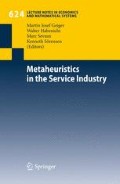Abstract
Determination of the Economic Order Quantities (EOQ) is critical for many service and manufacturing industries in order to achieve optimal operating conditions. Although there are numerous studies on solving EOQ problems with crisp parameters, the number of studies which consider EOQ problems with fuzzy parameters is very limited in the literature. In this paper, a multi-item EOQ problem with fuzzy parameters is considered. All of the parameters of the multi-item EOQ problem are defined as triangular fuzzy numbers. Afterwards the fully fuzzy 11 mathematical programming problem is solved directly (without any transformation process) by making use of fuzzy ranking functions and the particle swarm optimization algorithm. It is observed that the proposed approach is eligible in solving the present problem.
Access this chapter
Tax calculation will be finalised at checkout
Purchases are for personal use only
Preview
Unable to display preview. Download preview PDF.
References
Silver, E.A., Pyke, D.F., Peterson, R.: Inventory management and production planning and scheduling. Wiley, New York (1998)
Rommelfanger, H.: Fuzzy linear programming and applications. Eur. J. Oper. Res. 92, 512–527 (1996)
Jimenez, L.M., Rodriguez, M.V., Arenas, M., Bilbao, A.: Solving a possibilistic linear program through compromise programming. Mathware Soft Comput. 7, 175–184 (2000)
Jimenez, M., Arenas, M., Bilbao, A., Rodriguez, M.V.: Linear programming with fuzzy parameters: an interactive method resolution. Eur. J. Oper. Res. 177, 1599–1609 (2007)
Cadenas, J.M., Verdegay, J.L.: Using ranking functions in multiobjective fuzzy linear programming. Fuzzy Sets Syst. 111, 47–53 (2000)
Fang, S.-C., Hu, C.-F., Wang, H.-F., Wu, S.-Y.: Linear programming with fuzzy coefficients in constraints. Comput. Math. Appl. 37, 63–76 (1999)
Nakahara, Y.: User oriented ranking criteria and its application to fuzzy mathematical programming problems. Fuzzy Sets Syst. 94, 275–286 (1998)
Roy, T.K., Maiti, M.: A fuzzy EOQ model with demand-dependent unit cost under limited storage capacity. Eur. J. Oper. Res. 99, 425–432 (1997)
Roy, T.K., Maiti, M.: Multi-objective inventory models of deteriorating items with some constraints in a fuzzy environment. Comput. Oper. Res. 25, 1085–1095 (1998)
Mondal, S., Maiti, M.: Multi-item fuzzy EOQ models using genetic algorithm. Comput. Indust. Eng. 44, 105–117 (2002)
Yadavalli, V.-S.S., Jeeva, M., Rajagopalan, R.: Multi-item deterministic fuzzy inventory model. Asia Pac. J. Oper. Res. 22, 287–295, (2005)
Baykasoğlu, A., Göçken, T.: Solution of a fully fuzzy multi-item economic order quantity problem by using fuzzy ranking functions. Eng. Optim. 39, 919–939 (2007)
Chen, L.-H., Lu, H.-W.: An approximate approach for ranking fuzzy numbers based on left and right dominance. Comput. Math. Appl. 41, 1589–1602 (2001)
Jimenez, M.: Ranking fuzzy numbers through the comparison of its expected intervals. Int. J. Uncertain. Fuzziness Knowl. Based Syst. 4, 379–388 (1996)
Kennedy, J., Eberhart, R.: Particle swarm optimization. IEEE Int. Conf. Neural Netw. 4, 1942–1948 (1995)
Eberhart, R., Kennedy, J.: A new optimizer using particle swarm theory. In: Proceedings of the Sixth International Symposium on Micro Machine and Human Science, 39–43 (October 1995)
Hu, X., Eberhart, R.: Solving constrained nonlinear optimization problems with particle swarm optimization. In: Proceedings of the Sixth World Multiconference on Systemics, Cybernetics and Informatics (2002)
Engelbrecht, A.P.: Fundamentals of computational swarm intelligence. Wiley, New York (2005)
Dong, Y., Tang, J., Xu, B., Wang, D.: An application of swarm optimization to nonlinear programming. Comput. Math. Appl. 49, 1655–1668 (2005)
Stockton, D.J., Quinn, L.: Identifying economic order quantities using genetic algorithms. Int. J. Oper. Prod. Manage. 13, 92–103 (1993)
Author information
Authors and Affiliations
Corresponding author
Editor information
Editors and Affiliations
Rights and permissions
Copyright information
© 2009 Springer-Verlag Berlin Heidelberg
About this chapter
Cite this chapter
Baykasoğlu, A., Göçken, T. (2009). Solving Fuzzy Multi-Item Economic Order Quantity Problems via Fuzzy Ranking Functions and Particle Swarm Optimization. In: Sörensen, K., Sevaux, M., Habenicht, W., Geiger, M. (eds) Metaheuristics in the Service Industry. Lecture Notes in Economics and Mathematical Systems, vol 624. Springer, Berlin, Heidelberg. https://doi.org/10.1007/978-3-642-00939-6_3
Download citation
DOI: https://doi.org/10.1007/978-3-642-00939-6_3
Published:
Publisher Name: Springer, Berlin, Heidelberg
Print ISBN: 978-3-642-00938-9
Online ISBN: 978-3-642-00939-6
eBook Packages: Mathematics and StatisticsMathematics and Statistics (R0)

